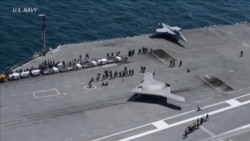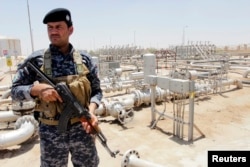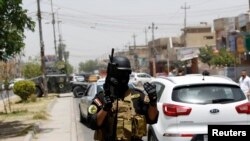The top U.S. military official says the Iraqi government has requested U.S. airstrikes to aid the fight against Sunni Islamist militants who have taken over key cities of northern Iraq.
Army General Martin Dempsey, Chairman of the Joint Chiefs of Staff, told a Senate subcommittee Wednesday that Iraq has requested U.S. air strikes against the militants, who attacked Iraq's main oil refinery Wednesday.
Dempsey said, particularly as a veteran, he is disappointed by the siege of the militants in Iraq.
"Al Qaida-inspired extremists raising flags over Iraq's embattled cities triggers in me the same thing that runs through the minds of any veteran who served there, which is bitter disappointment that Iraq's leaders failed to unite for the good of their people," said Dempsey.
Republican Senator Lindsey Graham said he believes it is in the interest of U.S. national security to honor that request.
U.S. Defense Secretary Chuck Hagel said the blame for the insurgency lies not just with the militants, but also with the Iraqi government for failing to establish a working relationship among different groups in the country's leadership.
"I think we go back to who is responsible for this: ISIL, they invaded, but also this current government in Iraq has never fulfilled the commitments it made to bring a unity government together with the Sunnis the Kurds and the Shia," said Hagel.
Traveling in Colombia, Vice President Joe Biden telephoned Iraqi Prime Minister Nouri al-Maliki, and the Sunni and Kurdish leaders. He stressed the need for a unity government in Iraq -- one that can meet the threat the militants pose to all Iraqis.
The clash between militants and security forces took place at the refinery in Beiji, located about halfway between Baghdad and Mosul.
Militants took control of Mosul last week, and India's foreign ministry reported Wednesday that 40 Indian construction workers have been kidnapped from the city. A spokesman said India has not received a demand for ransom and does not know the location of the missing workers. He also said 46 Indian nurses are stranded in militant-controlled Tikrit.
Iraqi Prime Minister Nouri al-Maliki gave a televised address vowing that his security forces would strike back against terrorism and described their earlier defeats at the hands of militants as a setback.
Also Wednesday, Iranian President Hassan Rouhani pledged that his majority Shi'ite country would do whatever is necessary to protect Shi'ite holy sites in Iraq from what he called "terrorists."
Obama hosts congressional leaders
President Barack Obama updated congressional leaders on Wednesday on the situation in Iraq and reviewed what he sees as options for "increased security assistance" for the country, which is grappling with insurgents led by the Islamic State of Iraq and the Levant.
"The president provided an update on the administration's efforts to respond to the threat from ISIL by urging Iraq's leaders to set aside sectarian agendas and to come together with a sense of national unity," the White House said in a statement after the Oval Office meeting, which lasted more than an hour.
"He also reviewed our efforts to strengthen the capacity of Iraq's security forces to confront the threat from ISIL, including options for increased security assistance," the White House said, noting Obama sought the views of the leaders and said he would continue to consult Congress.
State Department spokeswoman Jen Psaki said the political component is important for Iraq's long-term success.
"Our view is that Iraq and the successful outcome here is not contingent upon the intervention of any country," she said. "They need to take steps on the political front to be more inclusive, to govern in a non-sectarian manner. But the United States is - and the president is - considering a range of options, looking at factors including the national security interests of the United States."
Carney described that national security interest as making sure the Islamic State of Iraq and the Levant is not able to establish a safe haven in the region. The militant group has taken control of several Iraqi cities and has threatened to attack Baghdad.
Prime Minister Maliki met Tuesday with Shi'ite, Sunni and Kurdish leaders, and the group appeared on television to pledge unity.
Zebari discusses threat
In an interview with VOA Kurdish service, Iraqi Foreign Minister Hoshyar Zebari called the recent insurgency the "biggest threat" for the Iraqi government. He said terrorism in Iraq is not only a threat to Iraq and its neighbors, but also to the United States.
He said assisting Iraq in the current conflict would be the "best option" for the United States, and also said most Iraqi political leaders would prefer getting help from the United States than from neighboring Iran.
Source: White House
"Most of the Iraqi political leaders agree that American assistance in this fighting against terrorism in the country will be with less problem comparing to the Iranian participation," he said.
The United States has ruled out sending combat troops back to Iraq, but President Obama has ordered 275 military personnel to help provide security for the U.S. Embassy in Baghdad.
The U.S. is considering working with Iran. But the Pentagon says it has no plans to enter into military cooperation with the Iranians in any action in Iraq.
Some information for this report provided by Reuters.
Army General Martin Dempsey, Chairman of the Joint Chiefs of Staff, told a Senate subcommittee Wednesday that Iraq has requested U.S. air strikes against the militants, who attacked Iraq's main oil refinery Wednesday.
Dempsey said, particularly as a veteran, he is disappointed by the siege of the militants in Iraq.
"Al Qaida-inspired extremists raising flags over Iraq's embattled cities triggers in me the same thing that runs through the minds of any veteran who served there, which is bitter disappointment that Iraq's leaders failed to unite for the good of their people," said Dempsey.
Republican Senator Lindsey Graham said he believes it is in the interest of U.S. national security to honor that request.
U.S. Defense Secretary Chuck Hagel said the blame for the insurgency lies not just with the militants, but also with the Iraqi government for failing to establish a working relationship among different groups in the country's leadership.
"I think we go back to who is responsible for this: ISIL, they invaded, but also this current government in Iraq has never fulfilled the commitments it made to bring a unity government together with the Sunnis the Kurds and the Shia," said Hagel.
Traveling in Colombia, Vice President Joe Biden telephoned Iraqi Prime Minister Nouri al-Maliki, and the Sunni and Kurdish leaders. He stressed the need for a unity government in Iraq -- one that can meet the threat the militants pose to all Iraqis.
The clash between militants and security forces took place at the refinery in Beiji, located about halfway between Baghdad and Mosul.
Militants took control of Mosul last week, and India's foreign ministry reported Wednesday that 40 Indian construction workers have been kidnapped from the city. A spokesman said India has not received a demand for ransom and does not know the location of the missing workers. He also said 46 Indian nurses are stranded in militant-controlled Tikrit.
Iraqi Prime Minister Nouri al-Maliki gave a televised address vowing that his security forces would strike back against terrorism and described their earlier defeats at the hands of militants as a setback.
Also Wednesday, Iranian President Hassan Rouhani pledged that his majority Shi'ite country would do whatever is necessary to protect Shi'ite holy sites in Iraq from what he called "terrorists."
Obama hosts congressional leaders
President Barack Obama updated congressional leaders on Wednesday on the situation in Iraq and reviewed what he sees as options for "increased security assistance" for the country, which is grappling with insurgents led by the Islamic State of Iraq and the Levant.
"The president provided an update on the administration's efforts to respond to the threat from ISIL by urging Iraq's leaders to set aside sectarian agendas and to come together with a sense of national unity," the White House said in a statement after the Oval Office meeting, which lasted more than an hour.
"He also reviewed our efforts to strengthen the capacity of Iraq's security forces to confront the threat from ISIL, including options for increased security assistance," the White House said, noting Obama sought the views of the leaders and said he would continue to consult Congress.
State Department spokeswoman Jen Psaki said the political component is important for Iraq's long-term success.
"Our view is that Iraq and the successful outcome here is not contingent upon the intervention of any country," she said. "They need to take steps on the political front to be more inclusive, to govern in a non-sectarian manner. But the United States is - and the president is - considering a range of options, looking at factors including the national security interests of the United States."
Carney described that national security interest as making sure the Islamic State of Iraq and the Levant is not able to establish a safe haven in the region. The militant group has taken control of several Iraqi cities and has threatened to attack Baghdad.
Prime Minister Maliki met Tuesday with Shi'ite, Sunni and Kurdish leaders, and the group appeared on television to pledge unity.
Zebari discusses threat
In an interview with VOA Kurdish service, Iraqi Foreign Minister Hoshyar Zebari called the recent insurgency the "biggest threat" for the Iraqi government. He said terrorism in Iraq is not only a threat to Iraq and its neighbors, but also to the United States.
He said assisting Iraq in the current conflict would be the "best option" for the United States, and also said most Iraqi political leaders would prefer getting help from the United States than from neighboring Iran.
US Troops Deploying to Iraq
U.S. Troops Deploying to Iraq- Involves up to 275 U.S. military personnel
- Provides support and security for U.S. personnel and embassy in Baghdad
- Assists in temporary relocation of embassy staff to U.S. consulates in Basra and Irbil and to Amman, Jordan
- Military personnel are entering Iraq with consent of Iraqi government
Source: White House
"Most of the Iraqi political leaders agree that American assistance in this fighting against terrorism in the country will be with less problem comparing to the Iranian participation," he said.
The United States has ruled out sending combat troops back to Iraq, but President Obama has ordered 275 military personnel to help provide security for the U.S. Embassy in Baghdad.
The U.S. is considering working with Iran. But the Pentagon says it has no plans to enter into military cooperation with the Iranians in any action in Iraq.
Some information for this report provided by Reuters.








